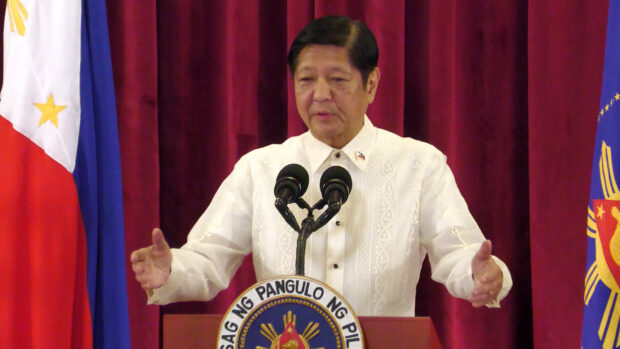Marcos says joint patrols with US have started in West Philippine Sea

President Ferdinand Marcos Jr. delivers his speech during an arrival ceremony at Villamor Air Base in Pasay City on Monday, Nov. 20, 2023, after his weeklong trip from the United States.(File photo by RYAN LEAGOGO / INQUIRER.net)
MANILA, Philippines — President Ferdinand Marcos Jr. on Tuesday announced that the Philippines and the United States have started their three-day joint maritime and air patrols in the West Philippine Sea.
“Today (Tuesday) marks the beginning of joint maritime and air patrols — a collaborative effort between the Armed Forces of the Philippines and the United States Indo-Pacific Command in the West Philippine Sea,” he said on his social media accounts.
But the president did not specify where the joint patrols are in the West Philippine Sea, other than to say these would continue until Thursday.
Marcos said the joint activity was aimed at enhancing the interoperability — or the capacity of military equipment of both military forces to operate in conjunction with each other — in patrolling the area.
“This significant initiative is a testament to our commitment to bolster the interoperability of our military forces in conducting maritime and air patrols. Through collaborative efforts, we aim to enhance regional security and foster a seamless partnership with the United States in safeguarding our shared interests,” he said.
The president said the joint maritime and air patrols are part of a series of events agreed upon by the Mutual Defense Board-Security Engagement Board (MDB-SEB) of both nations.
The MDB-SEB is a framework for security and cooperation, providing an opportunity for the Philippines and the United States to exchange views on security concerns and plan the range of military activities they will conduct the following year, including the “Balikatan” exercises that are held annually.
In 2012, the Philippine government, asserting its sovereign rights over the country’s exclusive economic zone (EEZ), renamed the portion of the South China Sea comprising the maritime areas of the western side of the Philippine archipelago as the West Philippine Sea.
The West Philippine Sea includes the Luzon Sea as well as the waters around, within, and adjacent to the Kalayaan Island Group and Bajo de Masinloc (Scarborough Shoal), according to Administrative Order No. 29 issued by former President Benigno Aquino III.
The announcement came a day after the president told a forum in Hawaii that the situation in the South China Sea, most of which is claimed by Beijing, had become more “dire than it was before.”
Noting that a broader agreement with China has not progressed, he said the Philippines was working instead on a code of conduct with its neighbors in the Association of Southeast Asian Nations (Asean) with conflicting claims on the South China Sea.
“We are still waiting for the code of conduct between China and Asean and the progress has been rather slow, unfortunately,” he lamented.
Late Monday night, however, China expressed its opposition to Mr. Marcos’ proposal, insisting that Asean must stick to their previous agreement.
“Any departure from the DOC framework and its spirit will be null and void,” Ministry of Foreign Affairs spokesperson Mao Ning said in a press briefing in Beijing, referring to the nonbinding Declaration on the Conduct of Parties in the South China Sea (DOC) signed between China and Asean in 2002.
‘Important task’
Mao added that formulating a code of conduct in the South China Sea was an “important task” to fully implement the DOC.
Nothing much has been accomplished in this regard, with the Department of Foreign Affairs earlier noting that the negotiations that began in 2013 have so far resulted in the finalization only of the preambular part or the introductory section of the code.
China, despite agreeing to work on a code of conduct as early as 2002 through the DOC, had previously argued that the time was not ripe yet and said it preferred to deal with individual claimants through bilateral negotiations.
Asean first became involved in South China Sea issues in July 1992 and released a declaration urging unnamed parties “to exercise restraint,” calling on “all parties concerned to apply the principles contained in the Treaty of Amity and Cooperation in Southeast Asia as the basis for establishing a code of international conduct over the South China Sea.”
Slow progress
In 1996, the regional grouping officially endorsed to Beijing the idea of a code of conduct, after it failed to obtain China’s endorsement of international norms of behavior over disputed claims in the South China Sea.
Though the DOC fell short of a binding code of conduct, as the Philippines had sought, the agreement was pushed by Asean to ease tensions in the area.
Mao also reacted to Mr. Marcos’ warning that China’s aggression has been inching closer to the country’s shoreline, building facilities in some shoals within the Philippine EEZ.
“China’s position and claims concerning the South China Sea issue are solidly grounded in history and the law,” Mao claimed.
“China carrying out construction activities on its own territory is a matter purely within the scope of China’s sovereignty and other countries have no right to point fingers at it,” she insisted.
—WITH A REPORT FROM REUTERS
For comprehensive coverage, in-depth analysis, visit our special page for West Philippine Sea updates. Stay informed with articles, videos, and expert opinions.